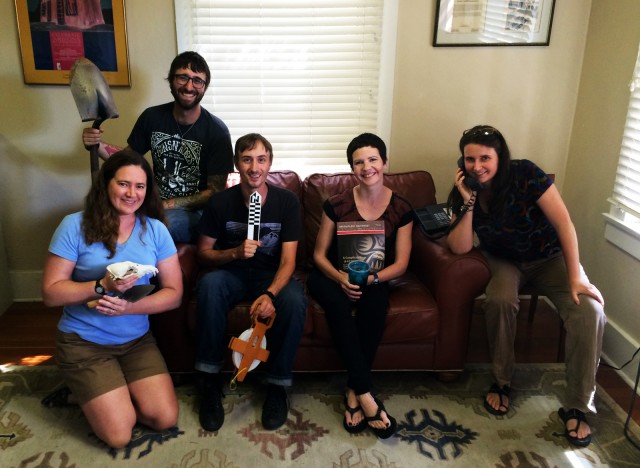- Home
- >
- Preservation Archaeology Blog
- >
- Four Words
(September 17, 2015)—Earlier this afternoon, Kathleen took a call from a mom in California who was helping her sixth grader with a homework assignment. They couldn’t find the answers on our website, so they reached out to us by phone.
Kathleen put the questions to us via email, and then shared our answers with the student. Here they are:
What four words are important to an archaeologist?
Aaron: Provenience, preservation, documentation, repatriation.
Jeff: Context, artifacts, history, culture.
Katherine: I was tempted to say people, things, time, and space, but if we get to use longer words, I’d go with humanity, diversity, material, and context.
Lewis: I’m going alliterative: curiosity, context, critical thinking, collaboration.
Karen: Here are four words important to *being* an archaeologist: persistent, adaptable, open-minded, and curious.
Kate: People, culture, past, data.
Doug: Doomed to Repeat It.
Why is it important to be an archaeologist?
Aaron: Because when we learn about other people with whom we are not familiar, we ultimately learn about ourselves and our connections to the rest of the world.
Lewis: Archaeologists examine information that spans an immense amount of time and space that allows us to interpret and explain modern human events, cherish the full range of human diversity, and prepare for the challenges in our combined future.
Karen: Archaeologists discover some of the many different ways humans have done things in the past: built houses, organized governments, defined what a ‘family’ or a ‘community’ is, found or grown food, used land and resources, and all the other ways we’ve come up with to live in an environment and get along with other people. Knowing about these different strategies shows us that the ways we’re used to aren’t the only ways of doing things, lets us understand other people better, and helps us think about things we might want to change or keep the same in the present day.
Jeff: So that we can learn about the lives and cultures of everyday people and societies not mentioned in written texts. Few people make it into the history books, but everyone leaves behind a trail of artifacts that tell a story to the archaeologist.
Kate: For me, it’s an act of respect toward those who came before us—an acknowledgment that their lives mattered and their stories are worth seeking and telling, to the best of our ability. Ultimately, it helps us understand what it means to be human.
So! Now we have some answers on our website. Please add yours in the comments.

2 thoughts on “Four Words”
Comments are closed.
Explore the News
-
Join Today
Keep up with the latest discoveries in southwestern archaeology. Join today, and receive Archaeology Southwest Magazine, among other member benefits.
I see Kate has the mos indispensable tool of all.
Context, context, context, context